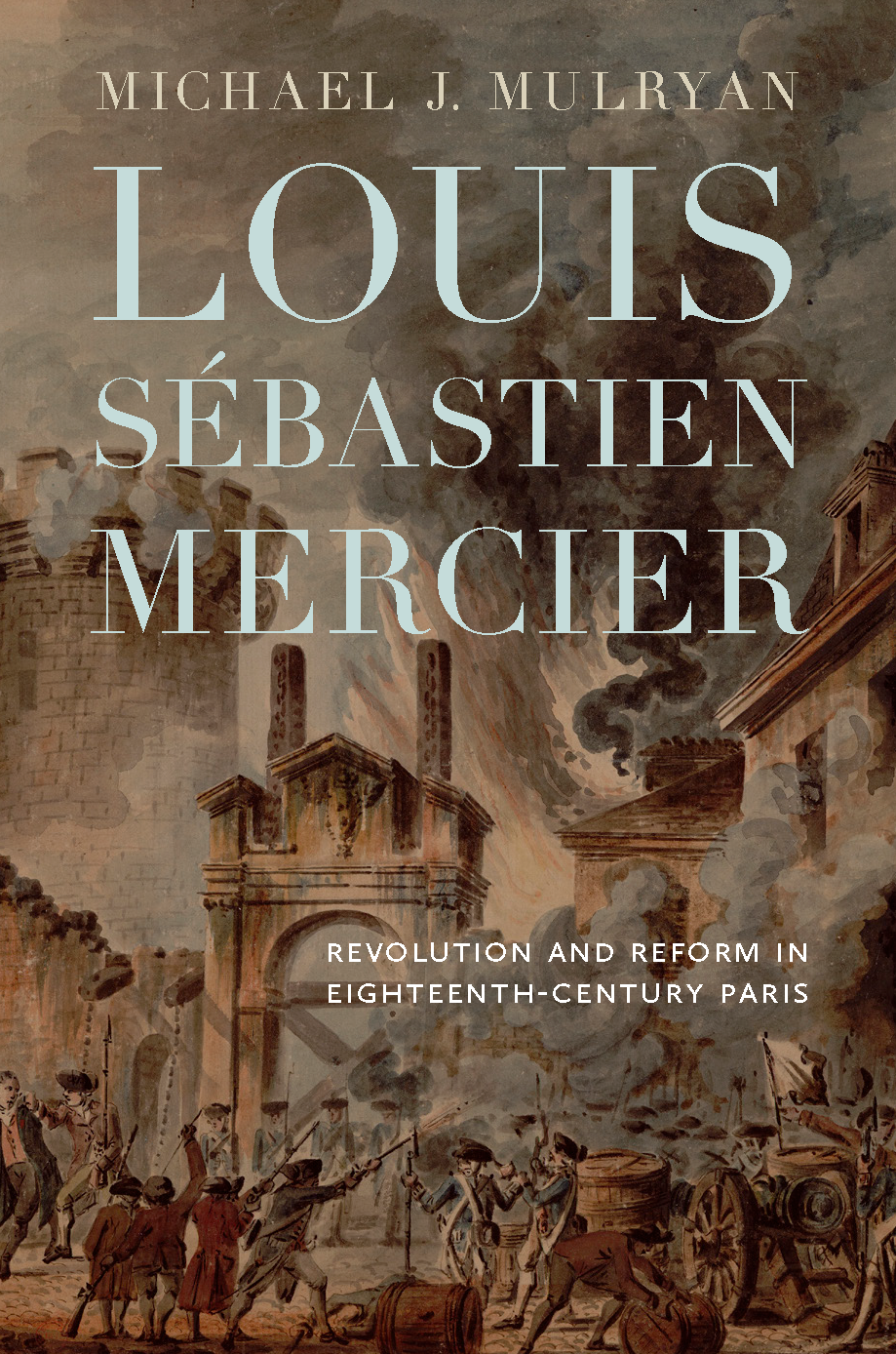
In his new book, Louis Sébastien Mercier: Revolution and Reform in Eighteenth-Century Paris, Michael J. Mulryan examines French playwright, novelist, activist, and journalist Louis Sébastien Mercier (1740–1814), who passionately captured scenes of social injustice in pre-Revolutionary Paris. Mercier’s urban chronicles identified the city as a microcosm of national societal problems, detailed the conditions of the laboring poor, encouraged educational reform, and confronted universal social ills.
</p>
Here, Mulryan talks with us about the importance of Mercier’s work in his own time, as well as his continued significance and resonance with our current times.
In the introduction of your book, you mention that Mercier considers whether destroying parts of the city to rebuild it entirely would be a more effective method of creating change. Did Mercier ever settle on an answer, particularly in the aftermath of the French Revolution?
In the tenth volume of Tableau de Paris, Mercier officially recants this stance, at least partially in response to criticism in the public sphere. Nonetheless, just as Mercier vacillates between describing Paris’s dark side and its grandeur as the capital of the Enlightenment, he similarly oscillates between a belief in progressive reform and a somewhat fatalist view of the corruption of mankind. When he writes his revolutionary urban chronicle Le Nouveau Paris, we see the same type of movement between what one might call naïve optimism, cautious optimism, and despair concerning how he viewed the potential of revolutionary reform and its impact on the city.
In the early 1790s, in some of his writings he espouses the belief that France can be completely regenerated, reborn from the ashes of the Ancien Régime, to become a model nation. He soon realizes, however, that there is always continuity between epochs and it is foolhardy to believe that one can rid a culture of its past entirely or even mostly!
Mercier’s statement that people are often trapped in poverty not because they are passive but because there are political systems in place to limit the betterment of their positions is an analysis that feels quite modern. Do you see many of Mercier’s other insights in today’s landscape (social, political, or otherwise)?
Yes, so many! This is one of the reasons why I have grown to love his work more and more over the years. He has so many insights but perhaps two will suffice to show how modern of a thinker he was. First of all, he shows how different social categories are interconnected and interdependent, and that because we depend on each other for society to function, everyone who contributes to a community’s well-being, regardless of their social status, deserves not only to be treated humanely and with decency but to be respected. Mercier reproaches the reader for overlooking the contributions of the laboring poor and any other members of society who appear to be invisible to their supposed superiors.
The second insight has to do with his understanding of not only fanaticism in its multiple forms but what leads people to become fanatical without even realizing it. We often like to believe “convenient truths” caused by confirmation bias and resulting in cognitive dissonance. This tendency terrified him, and this is why he so ardently believed in educational reform.
Mercier wanted to prevent fanaticism, but he did not want French citizens to be strictly cold, rational creatures: he wanted them to be full of heart and virtue. Choosing to do something virtuous because others will look fondly upon you for it is not enough. We must want to be virtuous because it is the right thing to do and do it to improve the social well-being of the entire community. In a world where selfies, going viral, the public shaming of individuals, and the number of likes we receive have become tantamount to how some measure people’s worth, I cannot think of a more important message.
You mention Mercier frequently used Paris as a focal point for his writing as the city seemed to be a microcosmic representation of macrocosmic national issues in France at the time. Is there a city or place that you feel could serve a similar purpose in the modern day?
In Mercier’s day, London and Paris were the European metropolises that merited the most attention due to both their size and cultural importance. Thus, it was completely logical that he viewed Paris as being the natural choice for his tableaux: not only was it representative of French issues, it was arguably a global city, much like London. Today there are several candidates for a vast urban chronicle like Mercier’s, and I should note that there are many similar types of work on global cities but perhaps none are as comprehensive as what Mercier did. New York City, Tokyo, Mexico City, Beijing, Berlin, Paris, London, Johannesburg are all natural choices, among others, but in terms of being a nerve center for economic power, I would have to go with New York City. Paul Morand’s famous prolonged travel essay on New York City (1930) does come to mind, and although it is an excellent book it is rather short. New York City, like every other major city, needs a gifted chronicler. There have been some but none as thorough as Mercier, at least that I know of.
Would you say that Mercier was ever disenchanted with the aftermath of the French Revolution in which the bourgeoisie effectively replaced the nobility’s role in the exploitation of the impoverished? How did the results of the revolution influence his approach to how the country needed to develop?
I am not sure that Mercier would view the results of the French Revolution quite in that light. He was a member of what is called the “petite bourgeoisie” himself, and although he was disgusted by the level of social injustice in the city not only after the revolution but during it, he viewed the implosion of the French government at the height of the revolution and everything that resulted from it as being the fault of the Jacobins. It was more a political issue for him than a class-based one, at least in the modern sense of the word (he had of course no love for the social order of the nobility but he had great respect for responsible members of the bourgeoisie, which, of course, included the Girondins and their sympathizers like himself [who were persecuted by the Jacobins]).
After the revolution, he thought French citizens needed to be morally reformed through instruction so that they would not want to exploit each other, period. He viewed one of the root causes of fanaticism and injustice as being immorality and not just ignorance. The enigma he wanted to solve was how to form individuals to be reasonable yet moral citizens.
You quote Mercier as saying, “I dare to believe that, in one hundred years, people will revisit my tableau, not for the quality of the painting but because my observations, whatever they may be, must be connected to those of the next century, which will benefit from our folly and reason” (7).
Is it your opinion that Mercier was correct in his self-assessment? specifically as his statement pertains to the idea his work is a reflection of politics and society that transcends time.
Yes, at least in one respect: scholars, novelists, journalists, and many other professionals have consulted and extensively drawn from Mercier’s urban chronicles not only for their historic relevance but also due to their literary quality as masterful urban tableaux (a genre that Mercier arguably invents or at least perfects). Many canonical nineteenth-century authors were greatly inspired by Mercier, including Hugo, Balzac, and Dickens, just to name a few of the greats. To this day, historians of the Enlightenment regularly cite Mercier as a fairly reliable source, even though his descriptions are not always scientific.
Most scholars and writers view Mercier as being extremely prescient, not only diagnosing the ills that caused the French Revolution but also showing how a city can be used to diagnose the problems of any society. This is where his status as both a masterful observer and proto-sociologist of sorts come into play. He realized that you cannot hope to understand how a society functions or dysfunctions unless you understand how all the minute parts of an organism work in unison to make a whole. He rendered the invisible visible but in order to do that he also took on an encyclopedic approach.
His tableaux are often used as documentary evidence by historians because they contain so much information: his Tableau de Paris is twelve volumes long and around 3,000 pages, whereas his revolutionary urban chronicle is six volumes long and around 1,000 pages. At the same time, however, you need only read a paragraph-long tableau to be able to appreciate the beauty of his literary style, which has a journalistic flair, but often also has the level of description one might expect in one of Flaubert’s novels. This is why he continues to inspire writers to this day: not only did he provide timeless warnings about social ills, he did it in an in-depth and beautiful way.
Louis Sébastien Mercier: Revolution and Reform in Eighteenth-Century Paris is available to order as of 15 September 2023 in paperback, hardback, and ebook.
Michael J. Mulryan is an associate professor of French at Christopher Newport University in Newport News, Virginia. His research focuses on the representation of urban space and the marginalized in eighteenth-century literature. He is the coeditor of Eighteenth-Century Escape Tales: Between Fact and Fiction (Bucknell University Press) and coeditor and cotranslator of an educational treatise by Mercier.
Image Credit: Christopher Newport University
